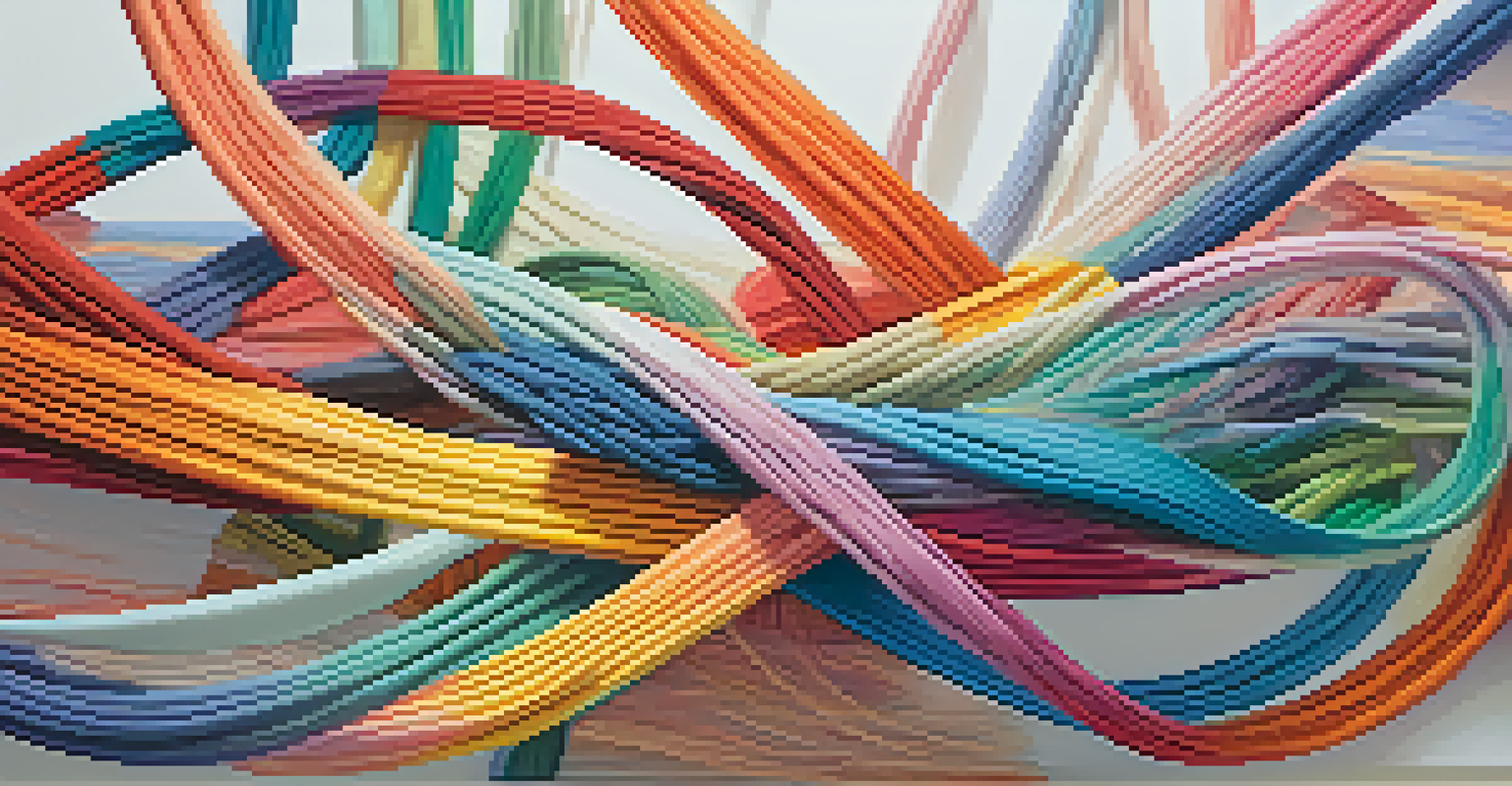Entheogens in Therapy: Transformational Experiences

What Are Entheogens and Their Role in Therapy?
Entheogens are substances that are believed to facilitate spiritual experiences, often leading to profound insights. Common examples include psilocybin (found in mushrooms) and ayahuasca, both of which have been used for centuries in various cultures. In therapy, these substances are being revisited for their potential to help individuals confront and process deep-seated emotional issues.
The experience of psychedelics is often one of profound insight and healing, and that is why they are so relevant to therapy.
The resurgence of interest in entheogens stems from recent scientific research that suggests they can play a critical role in mental health treatment. By enhancing emotional connectivity and fostering a sense of unity with others, these substances can create a conducive environment for healing. This shift challenges traditional views on mental health and opens doors to innovative therapeutic practices.
Therapists and researchers are now exploring how controlled use of entheogens can support therapeutic goals. For instance, they may help clients access repressed memories or emotions, allowing for a more comprehensive understanding of their mental health challenges. This approach not only encourages healing but also promotes personal growth and transformation.
Scientific Research Supporting Entheogens in Therapy
Recent studies have shown promising results regarding the efficacy of entheogens in treating conditions such as PTSD, depression, and anxiety. For example, research conducted at Johns Hopkins University found that psilocybin significantly reduced symptoms of depression in participants. These findings have raised hopes among mental health professionals looking for alternative treatment options.

Moreover, clinical trials are increasingly demonstrating the safety and therapeutic benefits of these substances when used under professional guidance. Participants often report heightened emotional awareness and a greater sense of connection during and after their experiences. This underscores the potential of entheogens to facilitate lasting change in mental health treatment.
Entheogens Aid Emotional Healing
Entheogens like psilocybin and ayahuasca are being explored for their ability to help individuals confront deep-seated emotional issues in therapeutic settings.
As more evidence accumulates, the stigma surrounding entheogens is beginning to fade. The scientific community is increasingly recognizing their value, making it easier for therapists to integrate these substances into treatment plans. This shift not only highlights the importance of rigorous research but also reflects a broader acceptance of holistic approaches to mental health.
The Therapeutic Process: How Entheogens Are Used
In therapeutic settings, entheogens are typically administered in controlled environments, often accompanied by trained professionals. This ensures that participants feel safe and supported throughout their journey. The therapeutic process often includes preparation and integration sessions to help clients make sense of their experiences.
Entheogens can be a powerful tool for healing, allowing individuals to confront and process their deepest emotional issues.
During a session, clients may engage in guided meditation or reflective practices, enhancing their connection to the substance. The goal is to create a space where individuals can explore their inner landscapes without fear. This supportive framework can lead to breakthroughs that traditional therapies might not achieve alone.
After the experience, integration becomes crucial. Therapists work with clients to process insights gained during the session, helping them apply these lessons to their everyday lives. This holistic approach not only fosters healing but encourages ongoing personal development, making the therapeutic journey truly transformational.
Personal Stories: Transformational Experiences with Entheogens
Many individuals have shared their profound transformations after engaging in entheogenic therapy. For instance, a veteran struggling with PTSD reported that a single session with psilocybin allowed him to confront and release painful memories, leading to a newfound sense of peace. Such stories highlight the potential for entheogens to catalyze healing on a deep emotional level.
Another individual, who battled severe depression, described her experience with ayahuasca as one of the most significant moments of her life. She felt a powerful connection to her past and received clarity about her life's purpose. These personal anecdotes serve as compelling evidence of the transformative power of entheogens in therapeutic contexts.
Research Supports Their Use
Recent studies indicate that entheogens can effectively treat conditions such as PTSD, depression, and anxiety, fostering emotional awareness and connection.
While results can vary, the common thread among these stories is the sense of liberation and insight many find through their experiences. These narratives not only inspire hope but also encourage others to consider entheogenic therapy as a viable option for healing and personal growth.
Challenges and Ethical Considerations in Entheogenic Therapy
Despite the promising potential of entheogens, there are challenges and ethical considerations that must be addressed. One primary concern is the risk of misuse or misapplication of these substances outside of a therapeutic context. This underscores the importance of professional oversight and clear guidelines in practice.
Furthermore, cultural appropriation is an ongoing issue, particularly when Western practices borrow from indigenous traditions without proper respect or understanding. Ensuring that these practices honor their cultural origins is essential in maintaining ethical integrity. Engaging with indigenous communities can provide valuable insights and foster collaboration.
Lastly, the legal landscape surrounding entheogens remains complex, with varying regulations across different regions. Ongoing advocacy for responsible research and policy reform is vital to ensure accessibility to these transformative therapies while prioritizing safety and ethical considerations.
Future Directions: The Evolution of Entheogenic Therapy
The future of entheogenic therapy looks promising, with increasing acceptance and interest from both the public and medical communities. As more research is conducted, we can expect to see a clearer understanding of the therapeutic benefits and potential applications of these substances. This could lead to more widespread therapeutic use in clinical settings.
Additionally, as mental health awareness grows, there is a greater demand for alternative treatments. This shift may pave the way for innovative therapeutic modalities that include entheogens as part of a comprehensive mental health strategy. The integration of these substances could help address the mental health crisis many are currently facing.
Ethics and Future Directions
While entheogenic therapy shows promise, ethical considerations and ongoing research are crucial for ensuring safe and respectful practices in the field.
Moreover, ongoing dialogue about ethical practices and cultural sensitivity will be crucial in shaping the future of entheogenic therapy. By prioritizing collaboration and respect for indigenous knowledge, the therapeutic community can ensure that this evolving field is both effective and respectful to its roots.
Conclusion: Embracing Entheogens for Healing and Growth
Entheogens present a unique opportunity for healing and personal growth in therapeutic contexts. As research continues to unfold, we gain a deeper understanding of how these substances can facilitate transformative experiences. This evolution in mental health treatment encourages us to explore new pathways towards well-being.
While challenges exist, the potential benefits of entheogenic therapy cannot be overlooked. By fostering safe, ethical practices, we can ensure that individuals seeking healing are supported through their journeys. This holistic approach not only addresses mental health challenges but also promotes a sense of interconnectedness and personal insight.

Ultimately, embracing entheogens in therapy invites us to rethink our approach to mental health. As we continue to learn from both science and personal experiences, the potential for transformation becomes clearer, offering hope for those struggling with mental health challenges.